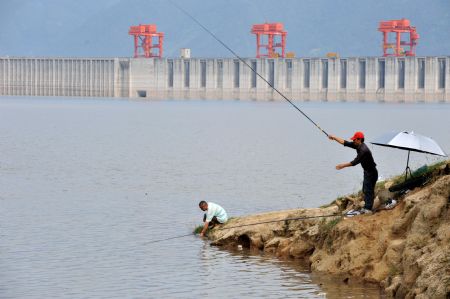China begins raising Three Gorges reservoir level to 175m
An operation to raise the level of water in the Three Gorges' reservoir to 175 meters began early Tuesday.
The level increased to 146.3 meters at 11 a.m. Tuesday from the 145.87-meter mark when the operation began, said Yuan Jie, chief of the control center of the China Three Gorges Project Corporation.
|
Two locals go fishing near the Three Gorges reservoir in Yichang, a city of central China's Hubei Province, Sept. 15, 2009. The operation to raise the water level of the Three Gorges reservoir to 175 meters began early Tuesday. |
"All 26 turbogenerators have been operating normally, and all spillways and other points issuing water in the dam were shut down to lift the water level," said Yuan.
China's State Flood Control and Drought Relief Headquarters and Yangtze River Flood Control and Drought Relief Headquarters issued a written statement Monday with the approval of the State Council, the country's Cabinet.
The dam's water level would be raised to 175 meters by the end of October, at a maximum of three meters a day. If the level is below the 175-meter mark by the end of October, water raising will continue into November.
"The water-raising process will be conducted in a controlled manner to prevent adverse results from sudden rises and falls in the water level," said Yuan. "When the project begins to lower the level next year, the daily range will be restricted to 0.6 meters to avoid protective embankment collapses and cave-ins."
Yuan said the impact of the water raising operation on the environment and the climate would be "partial" and "limited". The move would not also lead to massive silting", he said.
Weather experts say the Three Gorges Project's impact on the environment will not go beyond 10 kilometers, and the influence on local temperatures will be no more than one degree Celsius.
The Three Gorges Project, initiated in 1993, is a multi-functional water control system built on the upper and middle reaches of the country's longest waterway, the Yangtze River.
Its main components are the dam, a five-tier ship lock system, and 26 hydropower turbo-generators. Its key functions are flood control, power generation, shipping service, and water supplies.
The project is expected to fully play its multifunctional roles after the water level reaches 175 meters.
Cao Guangjing, deputy general manager of China Three Gorges Project Corporation, illustrated Tuesday the benefits of the water raising by saying an extra 10 billion kilowatt hours of electricity could be generated annually if the water level was raised from 156 meters to 175 meters. The navigable course in the Three Gorges reservoir could be further expanded by 150 km so that a fleet of 10,000 deadweight tonnage (DWT) could sail all the way from the Yangtze River Estuary nonstop directly upstream to Chongqing. Costs in both examples would be cut by a quarter.
An inspection panel led by Chen Lei, minister of water resources, late last month gave a license of approval for the project to store water to 175 meters, signalling the completion of the project.
The project has cost 184.9 billion yuan (27.19 billion U.S. dollars), including 69.3 billion yuan spent in resettling 1.27 million residents, said Lu Chun, deputy head of the office of the Three Gorges Project Construction Committee of the State Council.
The project began power generation in June 2003, and had generated 320.82 billion kwh of hydropower by late June this year, of which 318.8 billion kwh of clean energy has been sold to state power grids supplying east, central and southern parts of the country.
China's Ministries of Environmental Protection, and Ministry of Land and Resources, and other organizations Tuesday started monitoring various aspects of the dam's performance such as the quality of water in the reservoir, silting and the possibility of related natural geological disasters.
The Chongqing Municipal Civil Works Administrative Committee said Tuesday it had increased trash-clearing capacity around the project to ensure good water quality and safe shipping during the process of raising the dam's level.
 0
0 







